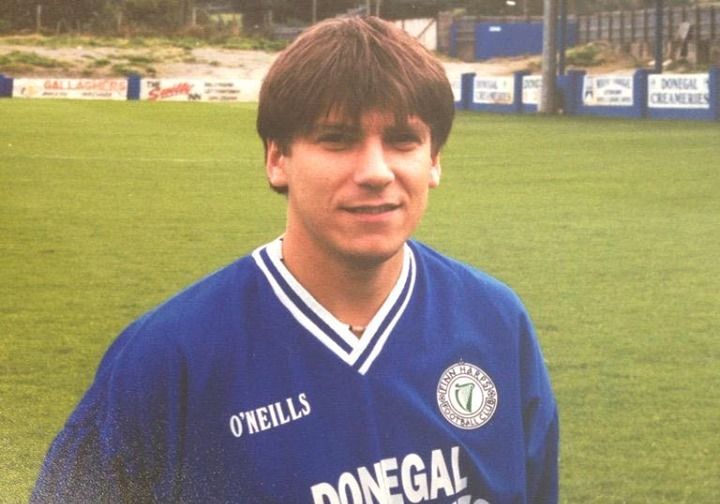HE ARRIVED in Derry in 1987, carrying only two suitcases and immediately had second thoughts.
The first impressions of the Maiden City that summer opened the eyes of Pascal Vaudequin.
The British Army cut a visible and fearsome presence on the streets of Derry in those days.
Vaudequin, a 20-year-old Frenchman who was signed by Noel King, spoke no English.
He looked at his luggage and wondered if he’d even unpack.
“I was a wee bit wondering if I had made the right decisions,” the now 53-year-old tells Donegal Daily/Donegal Sport Hub from his base his Vietnam, where he works as an Assistant Technical Director with PVF Vietnman.
He unpacked and, 33 years on, Derry is still ‘home’.
Apart from two years (1991-1993), Derry has been home for Vaudeqin since the halcyon times of the late 80s when Derry City caught the League of Ireland by storm and captured the imagination of the Foyleside public, who flocked near and far in their thousands.
“Derry were huge at the time,” Vaudequin, plucked from USL Dunkerque in France by King, with the help of an agent from Belgium. says.
“I was very well accepted by the Derry people. They made my life very easy.
“I was lucky to meet my wife (Maria MacFarland) and that helped me to settle down in Derry. It was a wonderful experience.
“I still live in Ireland. My wife and my family live there and my home is in Derry.
“Every time i have free time in Vietnam, I fly back to Ireland. I fell in love with the Irish way and the Irish people, their way of living. I was very lucky to be in a great family.”
The early days were not so enamouring for the young man who was joining a revolution at the Brandywell.
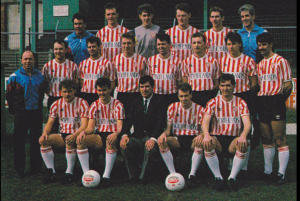
He says: “I had two bags – a bag of clothes and a bag of sports clothes. I just left to move to Derry with the two bags at 20 years old.
“The first time I arrived in Derry, my first impression was surprise at the presence of the army and everything on the streets. I wasn’t used to seeing that on the streets in France.
“It was a bit scary at the time. It was a big surprise.
“Really, really quickly I realised I was going for football and nothing else mattered.”
Serbian Alex Krstić spoke some French, as did Nelson Da Silva from Brazil.
Bar the comic utterances of Del Boy on Only Fools and Horses, the natives of Derry had no French. The quick-witted locals Christened their new Gallic hero ‘Paddy Quinn’, a moniker that stuck during those heady days.
Vaudequin, determined to make good his chance in this new and very different city, elected to go back to school and sought the help of St Joseph’s Boys’ School.
There, he learned the basics.
“It was very difficult to be fair,” he says. “It was quite tough, but that is the only way to learn. No-one in Derry was speaking French and everything was English, from the television to the people around me.”
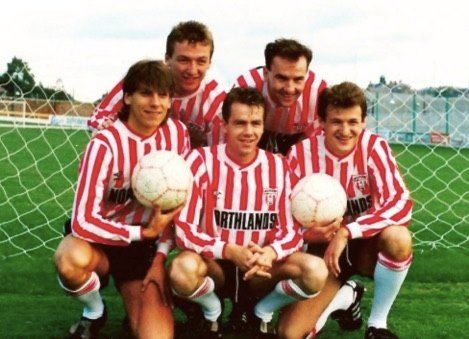
*****
HIS second season, 1988/89, ended with Derry winning the ‘Treble’. Jim McLaughlin’s squad took the Premier Division, FAI Cup and League Cup back to the Brandywell – an achievement that has not been replicated since.
Dundalk came close last year, but lost a dramatic FAI Cup final to Shamrock Rovers meaning Derry’s haul of ’89 remains unmatched.
“I wasn’t aware of how big it was,” Vaudequin says.
“Honestly, no. I was young at the time. Of course you realise it was something special, but I never realised it was that big. It is quite amazing that no-one else has done it since.
“You know you were part of something special, but at the time you don’t know how special because you are getting on with it.
“Sometimes it takes time to settle and only when you look back that you realise. You don’t sometimes enjoy the moments and you go through motions and emotions. It was a special time to look back.
“It was a beautiful team playing football the right way. They helped me a lot. They always come to me and helped me so much. I was there at the right time in the right spot. It took a while to get used to it.
“The supporters were absolutely amazing. They were unbelievable and we had huge crowds going away from home. I have so many memories and the European competitions and so on.
“Wonderful times.
“I was lucky to play with some great players. I got to know the players, people like Felix Healy, Liam Coyle who came on later, Jonathan Speak, Owen Da Gama, Alex Krstić, the team was so exciting, Stuart Gauld and so on…”
Vaudequin featured for Derry in European ties against Cardiff City, Benfica – who were then managed by Sven-Göran Eriksson – and Vitesse Arnhem.
Vaudequin was a midfielder by trade in France and the Irish football came as a jolt to his already-shocked system too.
“I never saw the football,” he gasps.
“I always remember the first couple of games I went: ‘Oh my goodness, I am just running and doing nothing here.’ It was a bit strange.
“The football was different. I was lost to be honest. I thought: ‘Wow, have i made a big mistake here?’
“Then, they put me at right-back. My manager in France wanted to play me right-back, but when Noel King put me there i found my position. I got used to the football in Ireland and I settled down.”
*****
VAUDEQUIN returned to his homeland in 1993, signing with Rodez AF in the south of France, where Krstić was also a team-mate.
Rodez played in Ligue 2 and among his opponents were Bixente Lizarazu and Christophe Dugarry who, just seven years later, became World Cup winners with France in 1998.
Rodez hit financial ruin in 1993 and were demoted with the French Football Federation coming down hard on clubs whose affairs weren’t running smoothly.
Vaudequin, at 27, had a decision to make.
“It was a no-brainer for me,” he says.
Within weeks, he was back in the Bogside.
“It was a bit of balance with education and I made the right decision. It was not about me at that stage, it was about my kids.”
He made the right call. One son, Brendan, is studying for a PhD in sports psychology and the other, Ciarán is working as an architect.
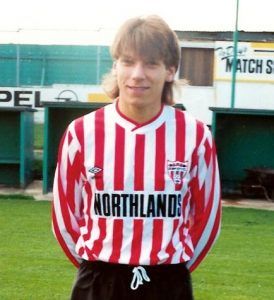
Pascal Vaudequin during his time at Derry City
*****
SHELBOURNE manager Damien Richardson came calling in 1996 and Vaudequin switched to Tolka Park – missing out on a Premier Division title with Derry under Felix Healy in 1996/97.
He did, though, taste glory in the FAI Cup final, Shels beating Derry 2-0 at Dalymount Park.
“I was lucky to be in a special team again,” Vaudequin says.
“it was a fantastic team and I think that was the best football I ever played. We had fantastic years and I was traveling up and down three times a week from Derry to train and play.”
The names – Mick Neville, Pat Scully, Pat Morley, Tony Sheridan – reel off the tongue as sharp as they did 23 years ago.
“A really special team.” he says. “We played some incredible football. It was great to experience the Dublin Derbies against St Pat’s, Bohemians, Shamrick Rovers.”
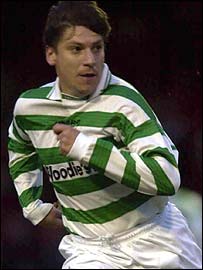
Pascal Vaudequin had a spell at Shamrock Rovers later in his career
*****
MIDWAY through the 1997/98 season, in January of ’98, Vaudequin moved his football career back to the north-west.
Finn Harps boss Charlie McGeever, already with some astute signings on board, saw Vaudequin as one of the missing pieces.
The Finn Harps Supporters Club stumped up a £4,000 transfer fee to prise Vaudequin away from Tolka Park.
A couple of months into his Harps career, Vaudequin was at the centre of a controversial night back in Drumcondra.
An FAI Cup semi-final replay was already guaranteed a splash in the following morning’s papers having been delayed due to a hoax bomb scare.
Just after the re-start, Harps’ Davy Dowling handled a Pat Fenlon header and Shels were awarded a penalty. With Jody Byrne, the Harps keeper, behind his line, wing his gloves on a towel, Stephen Geoghegan stroked the ball to the net.
The goal stood and Haps were enraged, Vaudequin having to be physically restrained by team-mates when he was booked for a tackle on Mark Rutherford.
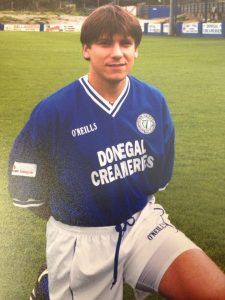
Pascal Vaudequin signed for Finn Harps in January 1998
*****
THE night left a sour taste, but it was nothing compared to 12 months later.
Easter Sunday of 1999 remains, even now 21 years on, one of the more memorable outings for Finn Harps’ long-suffering supporters.
Donal O’Brien and Jonathan Speak netted in a 2-1 win over Galway United at Terryland Park in an FAI Cup semi-final.
For Vaudequin, though, it is one of the darkest memories of his career.
Under a challenge from Gareth Gorman, Vaudequin went to ground in agony and was stretchered off, immediately taken to hospital.
The injury list makes him shudder still.
“The cruciate was totally loose, all of the ligaments were totally loose, the head of my fibula was dislocated and I had injuries also to my ankle,” he says.
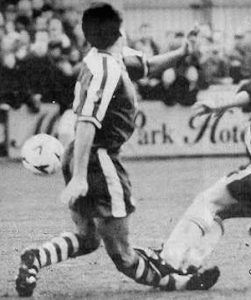
“It would have been better if I had broken my leg. I went to France for treatments and he said I was like someone injured doing skiing.
“My knee was like a balloon and my ankle was like a balloon. I had to get some injections.
“It was not nice and it was totally out of order. I had to live with the injury. I don’t hold a grudge now, but i did at the time. It is a game of football and you have to just get on with it.”
*****
THE FAI Cup final became a marathon for Harps. After two drawn encounters with Bray Wanderers, who had been relegated, Harps were pipped by the Seagulls in a third instalment at Tolka Park.
For Vaudequin, who was sat in the stand, the recollection is one of immense frustration.
“I worked my socks off to do something special,” he says.
“I didn’t feel happy inside around the final.
“I traveled with the team and stayed with them in the hotel, I have to be honest, sometimes I didn’t want to be there.
“It was so hard to see them get ready for a Cup final. That is a normal feeling. That was because I cared and I wanted to be a part of the team and a part of the day.
“It was really frustrating not to play in the finals. I was in the stand for the games. You want to play all the time. If you are happy not to play, you are in the wrong sport.
“I was really not happy at all and that is not a good memory. Then to lose on top of that…all the effort and everything else..”
Harps had narrowly missed out on European qualification via the League, too, finishing just one point off third-placed Shelbourne.
What might have been…
Vaudequin says: “It is a family club, Finn Harps. It is different to other clubs and they put so much efforts, financially and humanly. We all worked together, the players, directors, supporters and coaches.
“It was a very good balanced team, we had. We missed the European spot by so close and we should have won the Cup final. It could have been a special year for us.”
*****
VAUDEQUIN spent some time back in Paris for treatment on his injuries.
He was out for six months and believes his return was ‘too soon’.
He came back to a very different Harps. The hangover from the Cup final affected not just on the field. Off it, Harps were beginning to suffer financially.
McGeever resigned after six defeats in the first seven League games and Gavin Dykes took the baton.
“I had to leave the club soon after that,” Vaudequin recalls..
“When I look back, my career was basically over as I didn’t get back to do what I used to do.
“I lost a lot of fitness. When you get injured at that age, it is hard to come back.
“When I left Finn Harps, it was such a bad, eventful time with the financial situation.
“It is a lovely club with nice people. They had to get rid of people and they had no choice. It is not a nice feeling and you feel sorry for the people who are involved.”
Spells at Bohemians and Shamrock Rovers followed before his retirement and a path into coaching, beginning with doing a Pro Licence course in France.
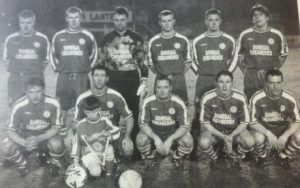
Pascal Vaudequin with a Finn Harps team in 1999
*****
Vaudequin did spend a brief time back at Harps, as assistant manager to Anthony Gorman.
A young and inexperienced Harps didn’t challenge for promotion, but Vaudequin ‘had a lovely time and some good craic’ at Finn Park.
He says: “We were okay. We were missing a couple of players to try and push for promotion, but we knew that from the start.
“Anthony is a smashing guy and I have a lot of respect for him. We were all pulling in the same direction on the minimum of resources. When Anthony left, I left too.”
A spell as manager of Institute followed, but he vacated the Riverside hot seat after less than a year.
He says: “I should not have gone for it. I was totally not experienced for it.”
Vaudequin worked for the Irish FA for 11 years, including a time on the Under-17 international staff and as an elite performance coach.
The wheel came full circle in 2018 when Vaudequin accepted an offer from Philippe Troussier to work in Vietnam.
Troussier has a vast CV, including managing Japan at the 2002 World Cup.
“He is the gentleman who taught me the football when i was young in the French Academy in Paris,” Vaudequin adds.
“He knew that i was going through as a manager and a coach. I was delighted when he asked me to come to work with him.
“The structure is absolutely magnificent. There are coaches from many countries and it is great to be able to share. It is very interesting and it is very challenging.”
He is adapting, settling and succeeding – just like he did when he unpacked his belongings in Glenowen Park in the Creggan 23 year ago.
Tags:







